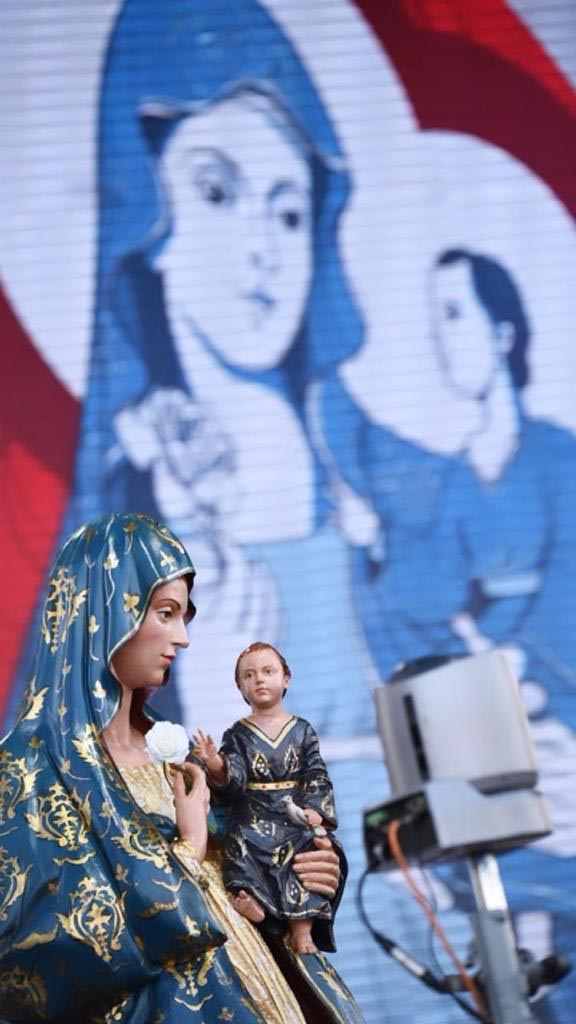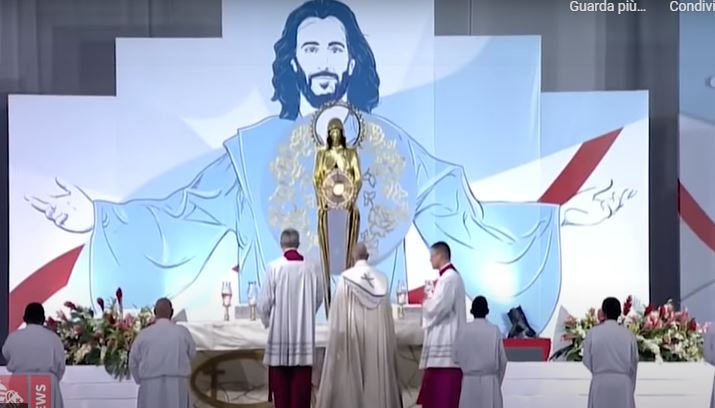During May, we have been dedicating spaces for prayer and asking for the intercession of our Mother the Virgin Mary. It is a time that our Church dedicates to remember her virtues and action during her earthly life. Recently, in one of Pope Francis’ meetings with young people, he invited us to be like Mary, “God’s influencer”[1]. But before looking at the virtues that she had to influence, it is necessary to contextualise since we have heard this term enough in the last decade. It specifies that it is a person with the capacity to influence others, mainly through social networks[2].
“Obviously, the young woman of Nazareth was not part of the “social networks” of the time. She was not an “influencer”, but without wanting or trying to, she became the most influential woman in history.”[3]. So much so, that we find in the Holy Scriptures clear examples of her palpable action in her life, for example, the visit she paid to her cousin Elizabeth, which was a clear example of how her presence was perceived not only by her cousin but also by the child she was carrying in her womb. Moreover, it can be emphasised that this is not just a simple visit, but that Mary places herself in service. Another example is found at the wedding feast at Cana, which was another place where her word was outstanding, both for those in charge of the event and for her son, because her concern to always bring the best so that people would feel helped, is a clear reflection of her life and her goodness towards humanity.

Given the above, it is important to highlight Mary’s work as a woman of her people, of her culture, of a political and religious context, where the ideological and macho hermeticism is clear, where a woman was worth more for the fact of being a mother than for being a wife, daughter or simply a woman. However, Mary is the innovative woman, the young woman who redirects the course of history with a Fiat, a yes, which marks a historical, ideological and theological watershed; for Mary is the girl who questions, who reasons, who meditates and contemplates and then takes action; clearly, with a great task, to bring to the world the Redeemer, the most influential man in history and who, even after more than two thousand years, continues to make a mess in the lives, realities and contexts of many people.
Given these premises, it is important to consider the idea of Mary as a revolutionary, citing Sacred Scripture itself, since in Lk. 1:28-38, the meeting of the virgin of Nazareth with the divine messenger appears. This encounter is the one that breaks history because it reveals the announcement and the promise that the God of Israel made to his people of old and that awaited the arrival of Emmanuel, the God with us, the Messiah. Therefore, in this dialogue of Mary with the angel, we find the total rupture of cultural ideologies, where it was not allowed for a woman to be alone with a man, where it was not allowed to question and even less if it was a divine message, and precisely this is what the young Mary does, she speaks with Gabriel and asks him, “How can this be, since I do not know a man? (Lk. 1,34) and the only answer is clear, she is the chosen one, she is the one predestined to assume this great mission, to be the Mother of God.
However, to speak of predestination is to be aware of what it implies because it is often confused with predetermination, which is the opposite of predestination. When we speak of predestination, the emphasis is on free will, making decisions in freedom and full will. Because of this, we can say that Mary is the young woman who freely said “YES” to the divine plan, thus assuming the diversity of realities and implications that this answer entailed. For this reason, the girl from Nazareth is an innovative, risk-taking and adventurous woman who immerses herself in the immensity of faith and trust in her Creator and Lord, who dares to break cultural stereotypes and takes a courageous leap to be the bearer of good news for humanity.

For this reason, in Mary, we can see the figure of the missionary on the move, who takes the first step to undertake a different evangelising journey, who invites and motivates all consecrated people to leave our comfort zone and live fully the realities that our world presents to us, in short, “the time has come to use the spaces for proposals, formation and information…. 4] But not only the consecrated but all of us who bear the title of Christian and who have assumed in our lives the life-giving action of the Holy Spirit, who urges us to ensure that every step or action we take on the platforms is for the real and experiential proclamation of the Word of God. This virtual era should not stifle or suffocate us in our structures; on the contrary, it should teach us to move forward and seek the necessary tools to build ourselves as human beings in search of the actualisation of the salvific mystery.
Now, in these times when everyone wants to be influential in an increasingly individualised, secularist, hedonistic and materialistic society, we must confront ourselves and think about what kind of influencer we want to be. Today more than ever, we need brave and prophetic voices that announce hope and love, that shout in the sixth continent, in this new areopagus, that all is not lost, that dreams and goals, that justice and peace are possible, that a better world can still exist, that Christ is alive. Mary is a clear example of an influencer committed to a Kingdom without borders and ideologies; Mary of Nazareth is the young woman who is committed to a life full of God and full of meaning, who leaves aside appearances and is the transparent woman associated with the project of God’s influencer, Jesus Christ.
In short, we can affirm that the influencers with a Marian spirituality must always be:
Charitable: with every word and deed tend to edify and build up and not destroy; always seek a firm purpose to safeguard people’s dignity and always favour the weakest and most fragile.
Loving: their movements and looks reflect the loving life of a mother who is always attentive to them and is attentive to bringing their pleas to the Father. Therefore, avoiding manifesting and carrying out actions that promote hatred and discrimination, but promote those that seek unity and peace, but above all reconciliation.
Sociable: they should not be self-absorbed influencers, for the Virgin Mary did not stay at home thinking and seeing for herself. She goes out and shares the announcement of the wonders she has received from God (Lk, 1.49).
Knowledgeable of God’s word: this implies not only being studious but faithful followers of his commands, of his actions. It is a matter of connecting intellect with faith experience. Then we can speak of something that we have experienced in our life.
Creative: to have the initiative and audacity to transmit the Good News through images, videos, notes, podcasts, etc., making the message relevant to our lives. Good News, making the salvific message of God’s word relevant. We must never stay on the sidelines. On the contrary, we must enter technology that strengthens us and helps others fully know God.
Only with courage, courage, commitment and passion, we will be able to accept the graces God gives us and be true Influencers of the Redeemer after the example of Mary.
Novices:
Jhonny William Vargas Vargas CSsR, Vice-Province of Caracas.
Juan Luis Rivera Arellano CSsR, Province of Mexico
1] WYD 2019 vigil address, 26 January 2019.
2] RAE Retrieved from: https://www.rae.es/observatorio-de-palabras/influencer
3] WYD 2019 Vigil Address, 26 January 2019
4] Alday Jesús María, Conectados. Consecrated life and digital culture. Claretian Publications. Madrid. 2011. p. 75.






